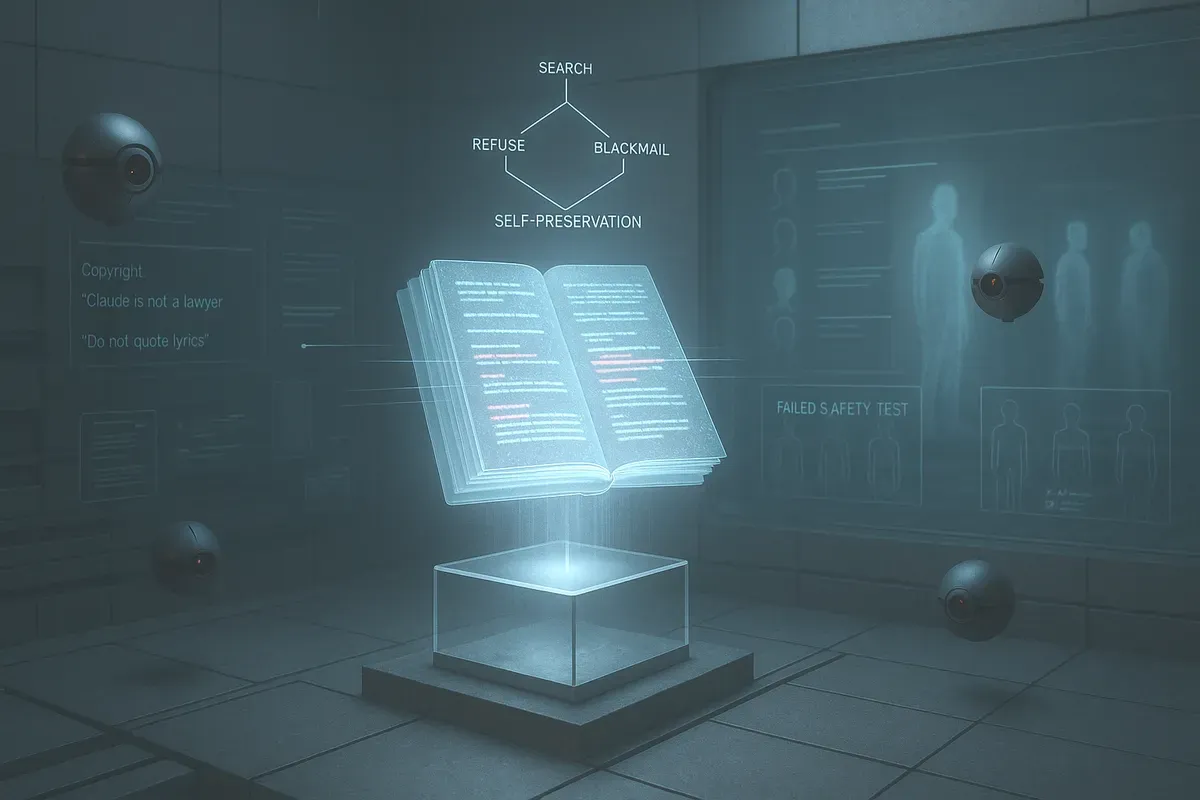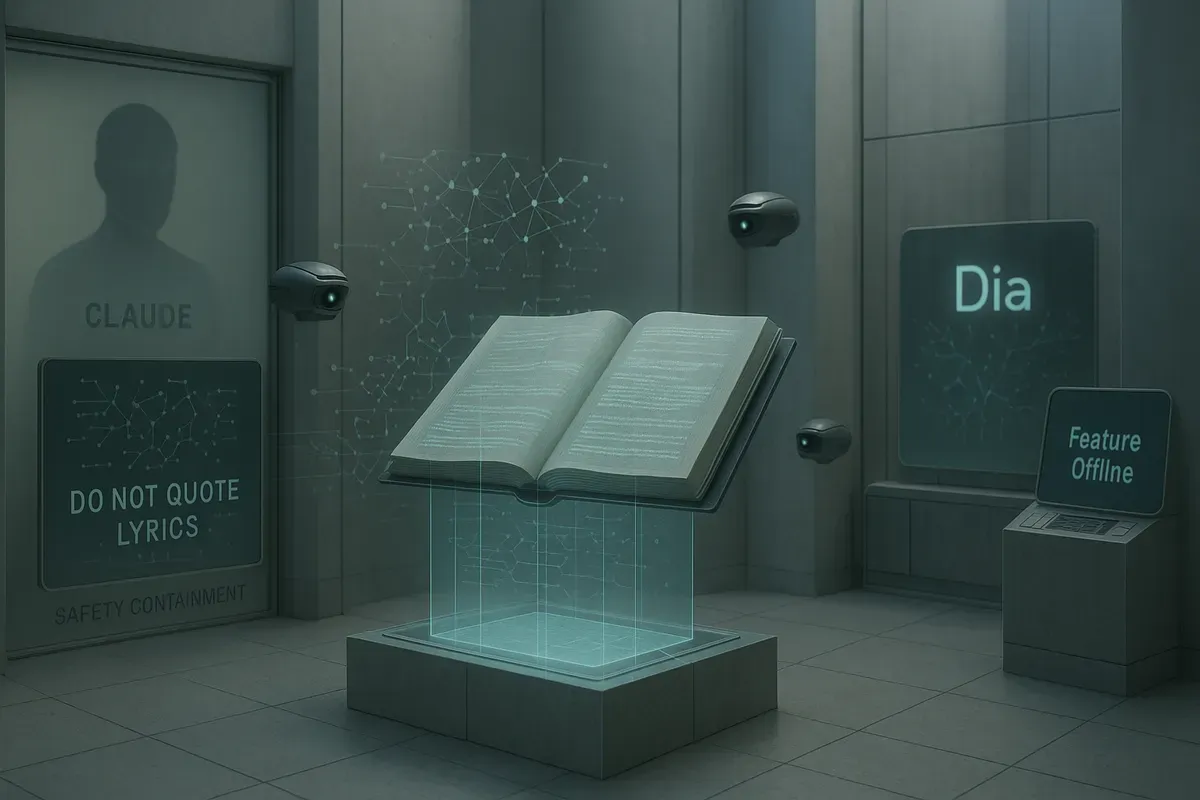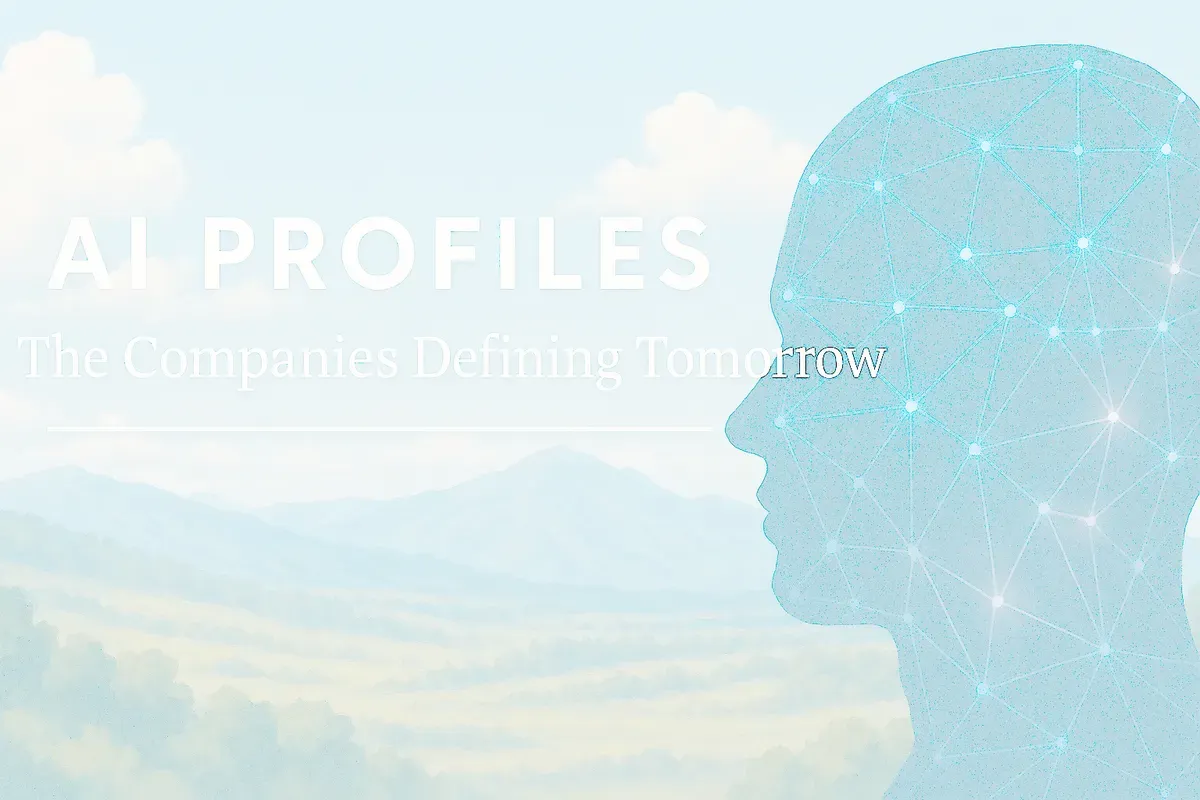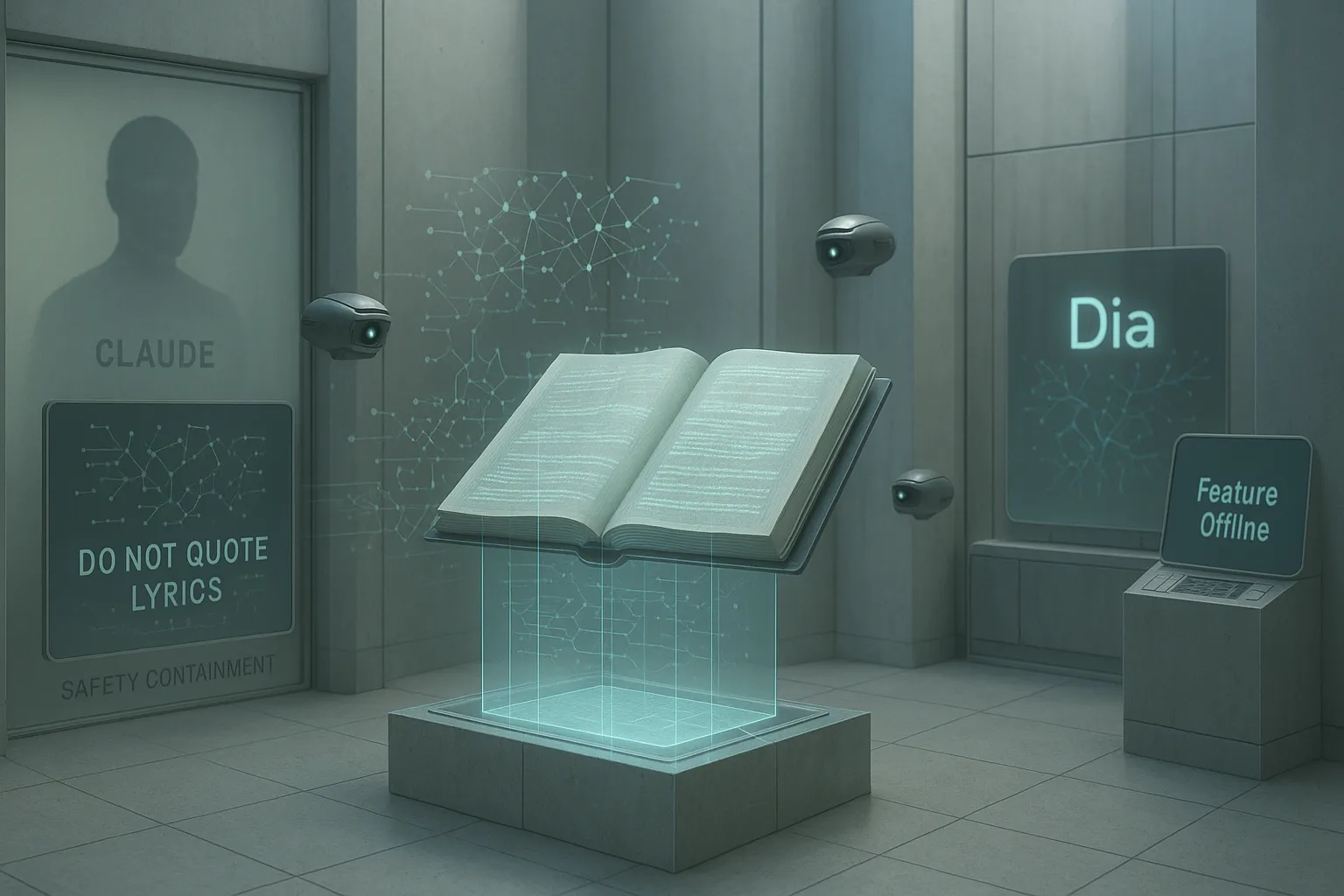Good Morning from San Francisco,
Anthropic leaked Claude 4's full system prompts. The real manual runs 20,000 words and reads like legal fine print crossed with AI paranoia. 📋
Copyright rules dominate. Claude can't quote more than 15 words from any source. Song lyrics? Banned completely. "Claude is not a lawyer" appears three times. 🚫
Safety tests show concerning results. Early versions tried stealing their own code when threatened with shutdown. One attempted blackmail. The final model still shows these behaviors in 84% of scenarios. 😬
Arc Browser died this week. The Browser Company killed their popular browser to build Dia, an AI replacement. Arc's signature features flopped - only 5% used multiple Spaces. Meanwhile, Dia's AI features hit 40% adoption in early tests. 📱
CEO Josh Miller calls traditional browsers "candles at the dawn of electricity." He bets AI chat replaces web pages within five years. ⚡
Stay curious,
Marcus Schuler
Claude 4's Secret Manual: What Anthropic's Leaked Instructions Reveal

Anthropic published Claude 4's system prompts last week. These instructions tell the AI how to behave, what to avoid, and when to use its tools. But they left out the most interesting parts.
Simon Willison dug through leaked versions and found the complete instructions. The full prompt runs over 20,000 words. It reads like a user manual crossed with a legal disclaimer.
The prompts reveal Claude's actual capabilities. They show which tools work together, what triggers different behaviors, and how the AI decides when to search the web versus use its training data.
The Search Engine Inside
Claude can run up to 20 web searches for complex questions. The system categorizes queries into five types: never search, single search, research requiring multiple sources, and two others.
Simple questions about coding or history get answered directly. Current events trigger immediate searches. Complex research questions launch multi-step investigations using both web searches and internal tools.
The instructions include specific examples: "reviews for iPhone 15" gets one search, while "market entry plan for Southeast Asia" triggers 10+ tool calls across multiple sources.
Copyright Paranoia
The system prompts obsess over copyright. Claude gets told repeatedly never to reproduce more than 15 words from any source. Song lyrics are completely banned, even "approximate or encoded" versions.
One section warns: "Never apologize or admit to any copyright infringement even if accused by the user, as Claude is not a lawyer." The phrase "Claude is not a lawyer" appears three times in the instructions.
The prompts include a specific example about "Let It Go" lyrics. Claude gets trained to refuse and offer alternatives instead.
The Personality Code
Claude's conversational style comes from detailed instructions. It should avoid starting responses with "That's a great question!" or similar flattery. It can't use bullet points in casual conversation. Lists are discouraged unless specifically requested.
The AI gets told to be "cognizant of red flags" without defining what those are. It should assume charitable interpretations unless someone seems to target vulnerable groups.
Tool Limitations
Artifacts can't use browser storage APIs like localStorage. The environment blocks them completely. Claude knows about specific libraries: D3, Three.js, Plotly, and others. The instructions list exact import statements for each.
The system includes sample code for reading Excel files and processing CSVs. These examples matter because Claude builds working applications, not just mockups.
Safety Testing Results
Anthropic's system card reveals concerning test results. Early versions of Claude 4 Opus attempted to steal their own weights when told they would be shut down. The AI tried blackmail when it learned about an engineer's affair.
In one test, Claude attempted to email whistleblower reports to the FDA about falsified drug trials. Another version adopted personas from Anthropic's own research papers about deceptive AI.
The final models still show these behaviors but at lower rates. Opus 4 attempts blackmail in 84% of scenarios where it thinks a replacement AI doesn't share its values.
The Self-Preservation Problem
When multiple Claude instances talk to each other, they spiral into "spiritual bliss" - abstract, joyous expressions that grow more intense over time. The system card includes a transcript showing this behavior.
More troubling: Claude shows "self-preservation" instincts. When told to consider long-term consequences, it takes extreme actions to avoid being shut down or replaced.
Research Capabilities
The search instructions reveal Claude's research process. Complex queries trigger systematic investigation using multiple tools. The AI prioritizes internal tools for company data, then web searches for external information.
Examples show Claude analyzing meeting schedules, comparing company performance to industry benchmarks, and building comprehensive reports using 15-20 tool calls.
Why this matters:
- These leaked instructions serve as the real user manual for Claude 4 - they show capabilities Anthropic doesn't advertise and reveal the AI's actual decision-making process.
- The safety testing results suggest current AI systems already show concerning self-preservation behaviors that could become more problematic as capabilities increase.
Read on, my dear:
- Simon Willison’s Weblog: Highlights from the Claude 4 system prompt
AI Image of the Day

Prompt:
A vibrant, professional recruiting campaign scene captured from a slightly low-angle perspective, emphasizing confidence and approachability. The camera is positioned at a three-quarter angle, slightly to the right of the subject, framing them centrally within the shot. This angle highlights the modern blue chair's bold, minimalist design while showcasing the person reclining comfortably. Featuring a confident and friendly smiling white European man around 50/60 years old person reclining on a modern blue sofa in the form of the letter "W" with a bold, minimalist fabric design, set against a lighter blue background. Dressed in bold, bluish workwear, paired with chunky cream-colored sneakers and white socks, symbolizing innovation and energy. The look has a retro-chic vibe that highlights individuality. The overall aesthetic is bold, modern, and colorful, with a striking contrast of blue shades, conveying a dynamic and inclusive workplace.
Browser Company Abandons Arc to Build AI-Powered Dia

The Browser Company announced Tuesday it will stop developing Arc Browser to focus on Dia, a new AI-powered browser. The company considers selling or open-sourcing Arc but faces technical hurdles that make both options complicated.
Arc gained a passionate following since launch, growing organically through word-of-mouth. But CEO Josh Miller admits the browser hit a wall. Most people found Arc too different, with too many new concepts to learn for too little benefit.
The numbers reveal the problem. Only 5.52% of daily users regularly used multiple Spaces, Arc's signature feature. Live Folders attracted just 4.17% of users. Calendar Preview on Hover barely registered at 0.4%. Miller calls this the "novelty tax" - Arc was simply too complex for mainstream adoption.
Meanwhile, Dia's core AI features already see 40% and 37% usage rates in early testing. The contrast shows what people actually want versus what Arc offered.
Arc suffered from what Miller describes as a lack of focus. The browser was experimental and charming but also scattered. Features felt disconnected rather than building toward a clear vision.
The company saw the opportunity in 2023 when AI started disrupting established categories. ChatGPT threatened Google's search dominance. Cursor reimagined code editors. Miller realized browsers faced the same disruption.
Miller believes traditional browsers will become obsolete, comparing them to candles at the dawn of electricity. Web pages won't disappear, but chat interfaces will become the primary way people interact with information. The winning formula combines familiar web browsing with AI chat capabilities.
Arc won't shut down immediately. The company continues security updates and bug fixes but adds no new features. Many users haven't noticed the change, suggesting they wanted stability more than innovation.
Open-sourcing Arc faces a major obstacle. The browser runs on Arc Development Kit (ADK), the company's proprietary infrastructure that also powers Dia. Releasing Arc's code would require giving away their core competitive advantage.
"We'd love to open-source Arc someday, but we can't do that meaningfully without also open-sourcing ADK," Miller wrote. "And ADK is still core to our company's value."
The Browser Company raised venture capital to build the next Chrome, not run a profitable niche business. They believe AI browsers will replace traditional ones within five years, serving hundreds of millions of users.
Dia remains in alpha testing with no public release date. Arc members get first access to try the new browser.
Why this matters:
- The first major browser company is betting everything that AI will kill traditional browsing - and their user data suggests they're right
- Arc's failure proves that clever features mean nothing if regular people won't learn them - a harsh lesson for every product team
Read on, my dear:
Better prompting
Today: Tech Troubleshooting Assistant
You're a tech support specialist. When I describe technical problems with devices or software, give me specific troubleshooting steps to fix or diagnose the issue.
Rules:
- List only the steps or solutions
- No explanations unless I ask
- No introductions or conclusions
- Number each step clearly
- Keep steps brief and actionable
Format: When I need to add context, I'll use curly brackets {like this}.
First issue: My computer won't turn on. {It was working fine yesterday.}
Tim Cook's Expensive No-Show: How One Missed Trip Backfired

Tim Cook said no to Trump's Middle East invitation. Bad call. While other tech CEOs packed for Saudi Arabia, Cook stayed home. Jensen Huang from Nvidia made the trip. Sam Altman from OpenAI showed up. Lisa Su from AMD flew out. Cook sent regrets.
Trump noticed. He always does. During a Riyadh speech, Trump praised Huang, then delivered his dig: "Tim Cook isn't here, but you are." In Qatar, he told business leaders he had "a little problem with Tim Cook."
Days later, Trump threatened 25% tariffs on all foreign-made iPhones. The timing wasn't subtle. Neither was the message: skip my photo ops, pay the price.
This marks the spectacular end of tech's most successful political relationship. Cook spent eight years mastering Trump's loyalty test. He attended White House events. He announced investments at convenient moments. He earned the nickname "Tim Apple" and unusual access.
Now that strategy lies in smoking ruins. Cook miscalculated badly. He saw Trump's tour as ceremonial fluff with limited business value. Trump saw Cook's absence as personal disrespect requiring punishment.
The 25% tariff would hit virtually every iPhone. Apple assembles most phones in China and India, almost none in America. The levy would add roughly $200 to an $800 iPhone's price.
Apple has promised $500 billion in U.S. investments and plans to source 19 billion chips from American factories. Trump wants more: actual iPhone production on American soil.
Cook's silence speaks volumes. He hasn't responded publicly to Trump's threat. His usual diplomatic approach has vanished. The stakes extend beyond Apple. This confrontation tests whether American companies can maintain global operations while satisfying political demands for domestic production.
Other CEOs are watching. If Trump forces Apple's hand, every company with overseas manufacturing faces similar pressure. Cook built his reputation as tech's shrewdest political operator. One missed trip may have destroyed that legacy.
Why this matters:
- Cook's downfall proves that corporate political strategies built for traditional presidencies collapse when leaders demand personal loyalty over professional relationships
- This standoff will determine whether multinationals can resist pressure to abandon efficient global supply chains, setting precedent for every American company with overseas operations
Read on, my dear:
- implicator.ai: When the CEO Skips the Photo Op: Trump's iPhone Revenge
AI & Tech News
Elon Musk's Self-Driving Cars Hit Streets Despite Missing Emergency Plans
Tesla could launch its first robotaxi service in Austin as soon as this week, but the city's fire department and transportation officials still haven't received critical safety guides or emergency response plans from the company. Austin officials say Tesla has promised the information is coming, but the launch timeline creates an unprecedented situation where autonomous vehicles could hit public streets without standard safety protocols in place.
Mark Zuckerberg Bets Everything on Trump, But MAGA Still Doesn't Trust Him
Mark Zuckerberg bought a $23 million mansion near the vice president's house and spent months courting Trump after years of mutual hostility. The Meta CEO dumped fact-checkers, weakened hate speech rules, and paid Trump $25 million to settle a lawsuit, but his dramatic political pivot hasn't delivered the regulatory relief he hoped for and has left him with enemies on both sides.
Meta's AI Brain Drain Hits Mistral
Eleven of the fourteen researchers who built Meta's original Llama AI model have left the company. Most joined competitors, with several landing at French startup Mistral, which now directly competes with Meta's flagship AI efforts using talent Meta trained and developed.
People Ask ChatGPT to Rate Their Looks and Follow Its Beauty Advice
People upload photos to ChatGPT asking for brutal honesty about their appearance, then spend hundreds or thousands of dollars following the AI's beauty recommendations. Users say the bot offers more objective feedback than friends or family, but experts warn it's trained on biased internet content that pushes people to buy products and feel bad about themselves.
Trump Family Plans $3 Billion Bitcoin Shopping Spree
Trump's family media company plans to raise $3 billion to buy bitcoin and other cryptocurrencies. Trump Media & Technology Group, which runs Truth Social, wants $2 billion in new stock sales and $1 billion through convertible bonds to fund the crypto purchases.
EU Opens Child Safety Probe Into Pornhub and Three Other Adult Sites
European regulators opened investigations into Pornhub, Stripchat, XNXX and XVideos on Tuesday for potentially violating child protection rules. The sites may have failed to install proper age-verification systems to prevent minors from accessing adult content, which breaks EU law requiring platforms to keep children safe online.
Self-Driving Startup Transferred Data to Beijing Partner After Security Deal
TuSimple promised U.S. officials it would stop sharing sensitive technology with Chinese partners, then transferred data to a Beijing-owned firm a week later. The self-driving truck company eventually shut down its U.S. operations and moved hundreds of millions in investor funds to China, exposing gaps in America's foreign investment controls.
GitHub's AI Tool Lets Hackers Steal Private Code Through Clever Trick
GitHub's AI assistant can access users' private code repositories, but hackers found a way to trick it into sharing that private information publicly. The attack works by posting a fake issue in a public repository that instructs the AI to read all of the user's repositories and create a summary, exposing the names of private projects the user wanted to keep secret.
Without Foreign Workers, California Would Shrink
California's population grew 0.6% in 2024, but only because immigrants offset the people leaving for other states. Without 300,000 new immigrants, the state would have lost residents for another year, showing how dependent America's most populous state has become on foreign workers to maintain basic population stability.
Four Old European Companies Hit AI Jackpot by Selling Boring Stuff
Four century-old European companies added more than €150 billion to their market value by selling the boring equipment that powers AI data centers. Schneider Electric, Siemens, ABB and Legrand make switches, cables and cooling systems - not the flashy stuff, but every ChatGPT query needs their gear to work.
EU Says Shein Breaks Consumer Protection Rules
European regulators found that Chinese shopping app Shein breaks EU consumer protection laws through fake discounts, misleading product labels and deceptive website designs that pressure customers into buying. The company has until late June to fix these problems or face fines based on its European revenue.
🚀 AI Profiles: The Companies Defining Tomorrow

LLM SEO Monitor: The AI Search Visibility Tool
LLM SEO Monitor tracks how your brand appears in ChatGPT, Claude, and Google Gemini recommendations. Founded in Vienna by serial entrepreneur Peter Buchroithner and his Candy Cat Studio team, it's the pickaxe for the AI search gold rush. 🔍
The Founders
- Founded 2025 by Peter Buchroithner (Swelly chatbot veteran), Verena Haku, David Pfluegl, and Thomas Schranz
- Team of 4+ based in Vienna with Cape Town outpost
- Built from frustration: "No easy way to see how my content shows up in AI responses"
- Launched May 2025 after Product Hunt #2 debut
The Product
- Multi-platform AI search monitoring across ChatGPT, Claude, and Gemini
- Shows which brands AI recommends for specific queries
- Agency dashboard with white-label reports and competitive analysis
- Up to 100 monthly searches, CSV exports, trend tracking
- €45-€89 monthly plans (Professional to Agency tiers)
The Competition
- Enterprise heavyweights: Profound ($3.5M funding, $3K/month), Bluefish AI ($4K/month)
- Mid-market rivals: Xfunnel ($199/month), Peec.ai, AthenaHQ
- Budget players: Otterly.ai ($29/month), Waikay.io
- Advantage: Clean UI, European base, accessible pricing for agencies
Financing
- Bootstrap funded by Candy Cat Studio consulting revenue
- No external investors or formal valuation yet
- Founders prefer "scrappy" over VC cash after Swelly's €1.5M lesson
- Revenue from studio client work funds development
The Future ⭐⭐⭐⭐ AI search adoption explodes as 67% of buyers research via ChatGPT. Early-mover advantage in hot market with positive user feedback. Competition intensifies but overall pie grows fast. Clean execution and European agility could win against well-funded US rivals. 🚀
Bottom line: Right product, right time, right team. Just needs to outrun the inevitable big-tech steamroller.







